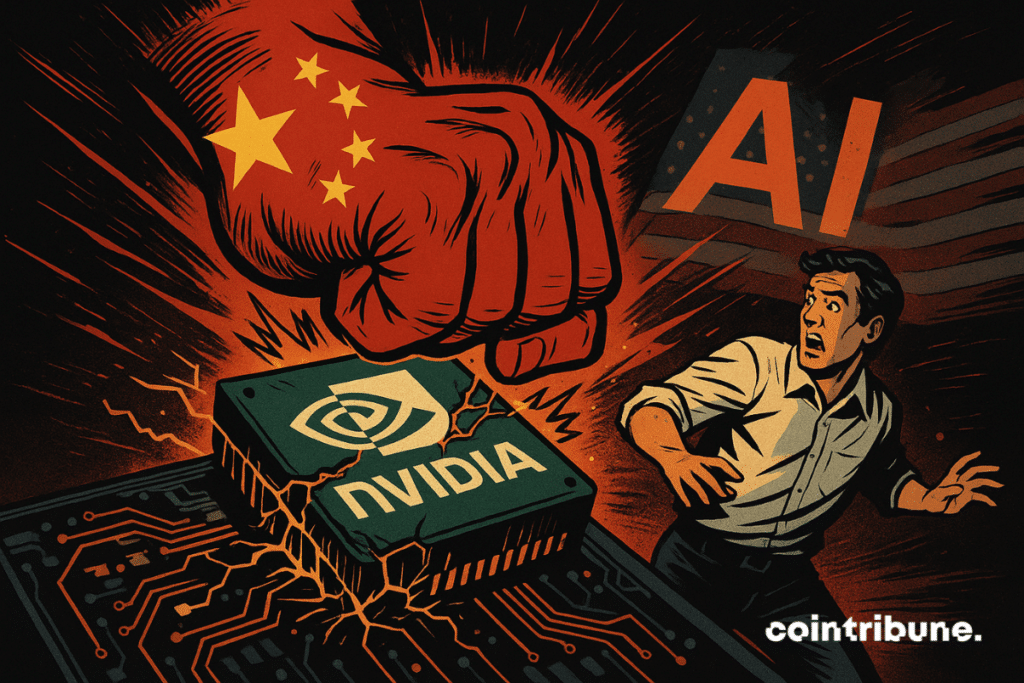Nvidia Hit By China’s Order Halting AI Chip Tests
The technological battle between Beijing and Washington reaches a new level. According to the Financial Times, China has ordered its digital giants, including Alibaba and ByteDance, to immediately suspend their purchases and tests of Nvidia’s latest artificial intelligence chips, the RTX Pro 6000 D. This decision illustrates the rising tensions around semiconductors, now at the heart of the geopolitical and economic rivalry between the two superpowers.

In brief
- Beijing orders Alibaba, ByteDance and other tech giants to stop their purchases of Nvidia AI chips.
- The directive from the Cyberspace Administration of China specifically targets the RTX Pro 6000D.
- Several companies had already started tests and planned massive orders before being forced to back down.
- The decision reflects Beijing’s desire to accelerate its technological autonomy in the face of American restrictions.
A targeted ban on Nvidia AI chips
The Cyberspace Administration of China (CAC) issued a formal directive against several Chinese technology giants, including ByteDance and Alibaba.
The order is clear: immediately suspend all ongoing tests and orders related to Nvidia’s RTX Pro 6000D chips, which were specifically developed to circumvent American restrictions on advanced semiconductors.
Here are the key facts :
- The CAC explicitly asked several groups to stop any use of the RTX Pro 6000D, the artificial intelligence chip launched by Nvidia for the Chinese market ;
- Some companies had already begun tests and validation processes with Nvidia-partnered server suppliers, with orders amounting to tens of thousands of units ;
- Following the directive, these companies immediately halted all ongoing operations, with no public comments from the concerned groups to date ;
- This ban goes further than previous ones, which only targeted the H20 model, an earlier version also designed for the Chinese market.
Asked during a press conference in London, Jensen Huang, Nvidia’s CEO, acknowledged the impact of this decision, while adopting a measured tone. “We can only serve a market if a country wants us to do so,” he said.
He added : “I am disappointed by what I see, but China and the United States have broader agendas to resolve. I am patient on this.” This statement comes as Beijing has just accused Nvidia of violations of its anti-monopoly legislation, and tense diplomatic exchanges continue between the two countries.
In this context, the Chinese decision can be interpreted as a strategic response to the American escalation on the front of technological restrictions.
An assumed strategic fracture : Beijing accelerates its technological decoupling
What distinguishes this ban from previous ones is its scale. Until now, Chinese restrictions mainly targeted the H20 chip, another version designed by Nvidia to remain compliant with American sanctions.
This time, Beijing directly targets the very latest generation, the RTX Pro 6000D, which had just been launched. This intensification reflects a strategic shift by Chinese authorities, who no longer merely slow down certain products but now appear determined to actively break their dependence on critical technologies coming from the United States.
Faced with successive American restrictions on advanced semiconductors, China, an influential member of the BRICS bloc, is multiplying initiatives to support its own hardware and component players. Demand for the RTX6000D was already limited even before the ban, with some Chinese companies deliberately choosing not to place orders. This could signal a growing confidence in local alternatives, even if they remain technically inferior at this stage.
In this climate, Nvidia finds itself in a delicate position. Deprived of a strategic outlet, the company sees its prospects in China darken, with a potential impact on its revenue, particularly in segments related to AI and, by extension, sectors dependent on computing power like Web3.
Maximize your Cointribune experience with our "Read to Earn" program! For every article you read, earn points and access exclusive rewards. Sign up now and start earning benefits.
Diplômé de Sciences Po Toulouse et titulaire d'une certification consultant blockchain délivrée par Alyra, j'ai rejoint l'aventure Cointribune en 2019. Convaincu du potentiel de la blockchain pour transformer de nombreux secteurs de l'économie, j'ai pris l'engagement de sensibiliser et d'informer le grand public sur cet écosystème en constante évolution. Mon objectif est de permettre à chacun de mieux comprendre la blockchain et de saisir les opportunités qu'elle offre. Je m'efforce chaque jour de fournir une analyse objective de l'actualité, de décrypter les tendances du marché, de relayer les dernières innovations technologiques et de mettre en perspective les enjeux économiques et sociétaux de cette révolution en marche.
The views, thoughts, and opinions expressed in this article belong solely to the author, and should not be taken as investment advice. Do your own research before taking any investment decisions.